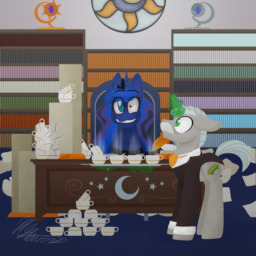
Resolution
“A restraining order!” she exclaimed, while pressing her hooves down so hard on the royal breakfast table that she could hear it creaking. “How dare that overgrown lizard.”
She picked up her cup and threw it once more across the room. Like the last two times, the cup and all of its black liquid content made a complete stop mid-air, then flew back to their original position next her plate, all the while surrounded by her sisters magic. It was a game they had often played when one of them was upset.
“There is more,“ Haywood said, sitting to her left, while he read the letter from the court in Vanhoover.
“Oh dear,” Celestia said.
“He demands twenty-thousand bits in medical costs, with another five for causing mental distress,” Haywood continued, while ignoring the whirlwind next to him. “That’s roughly the amount you have in your bank account.”
“And the price of that airship that you wanted commissioned,” Celestia mused, not quite able to keep the amusement from her voice. “What were you going to call it again?”
“The Moon's Return,” she growled, knowing that her sister knew full well that the construction would need to be postponed several years.
“Did you really have to smash his face in?” asked Celestia's royal advisor, Kibitz, from across the table. “If this goes to the press it could be quite the scandal.”
“I don't think Gordon Rich will make this public,” Haywood said. “The dragon seems to value his privacy.”
“Still, I doubt you can win this lawsuit, Luna,” Celestia said, in between sips of her morning tea. “We spent a whole day looking for anything illegal surrounding Gordon, and found nothing.”
“True, and he has four witnesses against our zero,” Haywood continued, and scooted the chair slightly away from her.
“Bah, why don't you two just kiss again,” she exclaimed, and threw away her cup a fourth time. This time it didn't stop mid-air, but instead splashed all over the Saddle Arabian carpet that had been a friendship gift during their last diplomatic delegation. She now remembered why they had stopped playing this game a millennium ago.
“That was a six-thousand bit rug,” Kibitz mumbled. Celestia and Haywood were too frozen to react.
“Could this morning get any worse?” she sighed, laying her head on the table. “I’ve thought of a few ways to get back at him, but they all have too many problematic drawbacks.”
Celestia snapped out of the stupor and turned to face her. “Drawbacks?"
“I could enact a law that makes it illegal to have more than twenty percent of your wealth in physical bits,” she said, with her cheek still pressed to the table. “That would force him and others to put a decent chunk back into the system, unless he uses it to buy goods outside of Equestria.”
“That's a pretty big ‘if’,” Kibitz complained, mustache twitching. “Such a law would be very hard to enforce, and cause unnecessary problems for ponies, with the worst case scenario being it not solving anything.”
“Exactly. We could also add a yearly fortune-tax that is based on a percentage of their wealth,” she said, without any real conviction in her voice. “But I assume you all know the problems that would cause.”
“The merchants and nobility are already annoyed at us because of the monetary crisis,” Kibitz sighed, shaking his head. “Adding more taxes at this point would be ‘the hay-straw that broke the pony's back,’ so to speak.”
“I think our best course of action is to work with Gordon, not against him,” Celestia stated, voice full of confidence. “We might find a solution that will benefit us both.”
She took her head off the table and leaned in close to Haywood. “Here it comes,” she whispered, and theatrically rolled her eyes.
“I think Twilight will be perfect for the job,” Celestia said, smiling at the prospect of giving her pupil another conundrum to solve. “I’m also very interested in their contact with the changelings.”
“So we let Twilight Sparkle fix everything for us again,” she deadpanned. “When was the last time you did something yourself?”
“Oh, don't be so sour, Luna,” Celestia beamed, giving her a warm smile. “Twilight is the Princess of Friendship after all, and from what you briefed me about him, Gordon is the kind of stallion that puts a high emphasis on business relations. It's like what he said about the changelings—he needs us more than we need him.”
“So we work with him instead,” she groaned, and waved at the service mare to bring in another cup of the black joy. “Are we really going to take his advice about using paper money?”
“I don’t think so,” Celestia chuckled. “It would risk being like that time we introduced tulips as a form of currency.”
“Ah, yes,” she replied. “It did actually work for a time, until those pegasi messed up the length of a winter, which caused all the ponies to eat the nation's entire supply of ‘money’ months before the next harvest.”
Kibitz and Haywood looked at the laughing sisters with more than a hint of scepticism.
“That sounds insane,” Haywood said, trying to wrap his head around the idea of using food in such a way.
“We ruled far fewer ponies during those days,” Celestia explained. “We could personally help anyone that got hurt by our policies, but we can’t do that anymore. Now that Equestria has become such a far-stretching nation, we play it safer now than in the past.”
—
“Oh my gosh, oh my gosh, oh my gosh, I’ve learned so much these last two days!” Twilight Sparkle beamed, bouncing around in circles inside the office, all while levitating several charts, diagrams, and what looked like anatomical studies of dragons. “Gordon Rich knows so much about dragon culture, and when I asked him why he never published a book about it, he simply said. ‘It never crossed my mind’. Can you believe that, Luna?”
“I can imagine it being hard for him to write in a normal book,” she replied, not sure what to make of the situation. Twilight was supposed to have had a quick meeting with Gordon, but had ended up staying there for two whole days. Now the energetic mare had suddenly teleported into her office out of nowhere, babbling about pie charts and how well Spike and Gordon got along.
“Oh, he never writes anything himself, he simply lets Air Service transcribe for him.” Twilight answered. At least the mare had given up on bouncing around, but still alternated between standing on her left and right legs. “Did you know that grown dragons don’t need to hibernate if they limit their dietary intake of amethysts? And that they create substantially less smoke if they polish emeralds before eating them? That’s so interesting!”
“Fascinating,” she agreed, and couldn’t help but to tap her hoof impatiently on the bench. “You should publish a book about it, and I will be sure to read it.”
Haywood’s head appeared in the open door, no doubt curious about what the commotion was about. Their eyes met and she nodded at him to enter, though he gave the excited Twilight a wide berth.
“I’ve got enough material to write three books!” Twilight exclaimed. “Though, Gordon wanted two-thirds of any royalties from the sales, and when I told him that I would never bother with royalties, he broke out in a coughing fit.”
“And did you convince him to stop sabotaging the economy?” she asked, being blunt about it to restrain Twilight from going off-topic.
“Yep!” Twilight cheered. “It took some effort trying to convince him that working with the princesses would yield the best long-term dividend.”
“How did you manage that?” Haywood asked, having taken one of the seats along the wall.
“I showed him charts of projected profits that compared him working with us related to against. He first stared at me like I was a crazy mare, but after two days of hard numbers-crunching presentations, he agreed to deposit the majority of his coins back into the banks and business.”
“So, no paper money then?” Haywood asked.
Both alicorns laughed at that.
“Of course not,” They both replied simultaneously after their chuckling had subsided. “That idea was silly and would have never worked.”
—
Her office was warm, cozy and lacked a certain Twilight Sparkle—who had returned to pester Gordon Rich with questions about dragon wing anatomy or something.
Haywood lay on the couch, slightly yawning as he read through the final reports about the bits that now were back in circulation.
“I think we can now put this case to rest,” she announced, and signed the last paper needed to conclude her report. “It was a fun adventure wasn’t it, Haywood?”
“Most thrilling,” he agreed, in a very neutral response.
“So, what more crises ails the nation?” she asked, with her mane slightly disheveled.
“There has been some legal issues over land between the Hooffields and the Mccolts again—” He stopped himself when he saw her twitching eye, and noted the once-again large stack of empty cups on her desk.
“Where do they live?” she asked.
Haywood looked at the window, then back to her, then to the mound of cups.
“If I tell you, can you promise to not send us flying through the window again?”
“No promises,” she grinned.

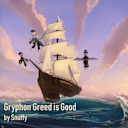

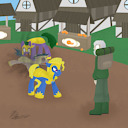
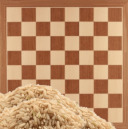


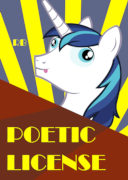
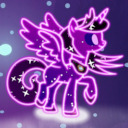

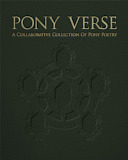
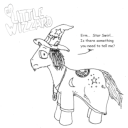


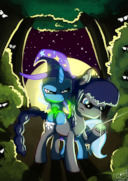
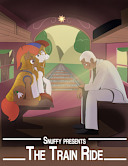
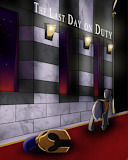

Pffffff haha
7815756
Wow, never get between Luna and her Coffee.
Needs to be a law that Equestrian citizens cannot take actions deemed, by the Crown, to be harmful to the direction of the nation. Seriously that should have been like, law #3. Are these instances of the Princesses completely without foresight? Smack the lizard with another few boulders!
7816391
It would probably be hard to convict someone for simply taking money out of the bank, even with such a law in place. Like Gordon said in chapter three, the crisis would have happened with or without him. It wasn't his fault that their system was flawed, besides, he had made attempts to help reform it several times.
7816322
It's a dangerous place; filled with twitching muscles, rash decisions and probably includes flying spherical projectiles.
7815756
 I hereby declare this the age of consumerism!
I hereby declare this the age of consumerism!
7817993
Oh, I'm aware. Just that they lacked the foresight to have a law in place that gave them the ability to protect their nation and way of life against someone trying to manipulate it from within the citizenry or the system itself is a little flabbergasting. Or that they'd restrict themselves so much despite being monarchs rather than figureheads. I take it they gave up the rights of an absolute monarchy?
7818155
Yup, I did blend Equestria and Colonial England in this story, and like Haywood said in the first chapter.
It's true they lacked laws that prevented inside sabotage by their own citizens, but technically they also didn't need it, since they managed to solve the crisis without it—even if the fundamental problem remained unchanged. They could have had a law in place that said "It's legal until a princess says so." But by just having such a law in place can be very uncomfortable for the population, as it could make the princesses be viewed as tyrants.
Still, I think you highlight something that should maybe be added in the story at the end. With Luna adding a law against currency manipulation, though I wanted to keep the economic and law talking at a bare minimum, since it's a comedy after all.
7818189
I, for one, would welcome a wise and benevolent tyranny that was biased towards my well-being and happiness. Sure can't trust people like me to get the job done right and have a plan for the future! Letting themselves be so restricted might assuage fears of tyranny, but it does so by giving everyone the belief they have some power and control over their rulers - including the ones who should never have that belief OR power, and would abuse it. Random thought.
I think that would help wrap things up nicely. If you don't have preventative measures in place to stop things like this from happening, at least reactionary ones to stop it from happening again.
Very goofy fun, bravo n_n
Dragon Greed is Good is a story I actually ended up reading twice, with a few days of work and general distraction between the readings. The first read particularly was defined by that most double-edged of qualities: enjoying it enough to forget my reviewer’s eye, though; both reads were very enjoyable. On the whole, DGIG is fun, it is self-contained and lives up to its chosen tag of comedy, while bringing a surprisingly mixed set of qualities: there are moments of intrigue, economic discourse and mad-cap dashes.
All this being said, something has nagged me all this while from the back of my mind. Translating this abstract feeling into a conscionable review was a big part of my second reading and one I can only hope I make definitive progress on explaining the further into this review I write.
Let’s get to it than, this adventuresome tax-law comedy.
A few small things I noticed fairly early on:
The narrative adopts a sort of custom-built first/third person combo style where dialogue is concerned. She is She is Luna is Luna and everyone else is everyone else. While I don’t think this peculiar habit would likely be accepted as correct in the most literal sense, it’s very certainly Luna-centric and internally consistent throughout the story, so on balance I accepted this quirk with little fuss, noting it as little more than a neat curiosity. Outside of this, the technical side of things is cleanly written and well within my standards for good enough.
The character of Haywood is never actually given definition, in the physical sense. The closest the story comes is:
-
-
Now I would be betraying my usual style of going deep (and my chosen stance in a past debate: Are Character Descrpitions Necessary?) to simply say “no description = wrong.”... but that said, I do believe that the absence here symptomatic to something else - symptomatic to the *thing* I mentioned above, the one I’m circling closer and closer to putting into concrete and communicable terms.
...Allusion.
...I have a feeling that this is going to be a key term in this review.
But back to the point at hand: Haywood. His role externally is familiar: He is the straight man, the partner to Luna’s talks and observer to her antics. Internally - that is, within the setting of the story, it’s a little more vague.
The above quote in addition to a skateboard cutie mark reveals that Luna hired Haywood, but beyond that, two reads later and I am fairly confident there’s really no mention of his defined purpose or role, though as an assistant or batman* of sorts, in general terms, is fairly obvious. In the specific, not so much. Even
*please please see the clever pun
Even Kibitz, introduced only in the last moments of the story, is properly [introduced:
-
-
We also know that Haywood is an older gent.
What that amounts to still, though; we have an absence of any definite appearance, an absence of any defined role (though the generalities of it are apparent). For a leading character, these blank spots are... strange.
-
-
This scene is one that stood out to me in particular. I believe it does especially well for capturing the still as yet ill-observed observation that will, eventually, be central to this review.
It also expresses a certain realization for me. When I asked myself: Where in this story is the comedy? The answer I found, again and again, was that the comedy of DGIG is in its narrative.
Look to the quote. (I still wonder what a pizza salad is. Salad pizza I can comprehend, but... pizza salad?)
Anyway - the humour in that quote, I think few would argue, is in the latter half; in the description of Luna sticking her head out the window, like an honest-to-goodness blue collar schmuck working the night-shift.
And it’s funny! It is. Where it loses out is that it’s told, less than shown. Throughout this DGIG, the jokes - like here - are one or two paragraph gaffs, set up and knocked down by the narrative... in fact, a strong impression I had of the overall writing style is that characters run around and set up a funny incident to allude to, only to step away from those moments like firecrackers, rather than experience them.
There’s that word again... We zoom in a little bit...
-
-
...and find that Haywood, fun, oddly transparent Haywood, vanishes entirely from the skit. The moments where he’s *present* are underlined, while the joke is in bold.
In an odd way to consider, the comedian-heroes of the story are being shooed away exactly when the jokes need telling.
So it seems to me, at any rate. Even Luna, in scenes like this, is much more a puppet of narrative than an expressive, personal character.
Another example:
-
-
We see the exact same pattern - the characters are present in the story, they step back from the story for a moment for a joke to happen, then neatly step back in when it concludes to resume themselves.
And it occurs to me now EXACTLY what that back-of-the-mind sensation was:
Laugh Tracks.
(duh duh duhhh
Now before we go exploring that revelation, let me recapitulate a few main points to bear in mind.
People hate laugh tracks. I don’t hate this story. I actually really quite like it. I believe there’s an insight to be gained at looking at the silly things that are laugh tracks though, so that’s what I’ll do.
Secondly, comparing mediums means things don’t map exactly. There can be no literal laugh track in a written story, just a figurative one. But the point stands: I believe there’s a perspective to be gleaned from looking at them.
That said and aside, let’s hop in.
Laugh tracks are used as a psychological trick in sitcoms to co opt the audience into laughing. (ever seen a clip with them removed?) More to the point: there’s three distinct phases to every laugh track joke I’m realizing:
1 - the characters say their build-up line (whether it’s actually a joke or not, funny or not, is to individual discretion)
2 - the characters freeze up unnaturally for several seconds and the laugh track plays, signifying the audience to acknowledge the joke.
3 - the characters resume their antics. Instead of acknowledging whatever supposed humour was just had, they instead drive on forwards to the next set-up.
Sometimes step 3 is just step one 1 again.
Now... remember Underscore, Bold, Underscore, from the quotes above?
Characters talk, Haywood disappears and Luna does something funny, Haywood reappears.
1, 2, 3. Yeah.
When the story’s in a mind to be funny, this is the pattern it follows. And I think this is why, despite enjoying and appreciating the comedic value of the story I’ve constantly felt a little disconnected from it. There’s that slight freezing up, that slight distancing of characters from the front and centre of where the jokes are, and that dampens the overall impact.
In both instances I’ve shown, Haywood doesn’t acknowledge the inherent crazy silliness of what’s happening. When Luna has just wriggled her majestic moon butt through a high-rise window, Haywood in magical tow, the first and only thing he follows with is to comment that she’s taken a valuable map.
(Moral of the lesson: Always ALWAYS spotlight butts. Moon butts doubly so.)
Seriously though: funnier than a comment on a map, are moon butt window breakers, to be sure.
Overall, I’m not sure if laugh track style was done deliberately as a stylistic choice or inadvertently. And I feel I really do need to stress and repeat, because laugh tracks can be such reviled things: this story isn’t bad by any measure for having commonalities with sitcoms and their laugh tracks in its formatting. It is possibly limited in its effectiveness because of them, but my aim is always for a writer to look at their writing with new light, not to disparage a writer to their writing.
All in all, I suppose that was a very long-winded, hyper-analytical way of saying that I think the jokes can be written out over a little more time and involve a little more presence from the characters. As actions, reactions and words that happen in the now rather than a moment of time to recap as if coming at it from after the fact (like pizza moon raising and window butting)
The ‘cue to laugh’ quality of the laugh tracks will be lost, to be sure but truth be told, I trust in the humour that’s inherent to DGIG. If something is comedic (and DGIG is comedic in essence as well as name) few people need to be told so. If anything, being prompted to laugh stubs the genuine article. I would enjoy seeing these scenes stretched out over time, time for the characters to get stuck in and it disappoints that they are summarized so soon, to be moved off towards the next.
Here’s a scene that came to mind:
It’s Doctor Who so, you know, allons-y warning.
There’s still a clear and defined punchline in that DW scene, but there’s no rush getting to it. There’s no glossing over of events and, ultimately, the funnyness knows it’s funny, it takes its time with a real joie de vivre - “joy of living” - its not in a rush.
1- In the tail-end of this review, I can come to a few key points. The overall structure to the plot of DGIG is really good - it’d actually work in several different genres. It could have been a mystery, or a drama, or a sad story, combinations of mulitple tags... and the fact that I see all variations working within the basic plot and also making tax-law and economics interesting is definitely a credit to the writer’s sense of narrative structure. That honestly deserves more praise than I’ve given in this review, obsessed as I’ve been with strange tangents in the hunt for some inchoate revelation.
2 - DGIG works as a comedy, but constrains itself when it doesn’t have to. The humour is there - as a reader I smiled in the first reading and the second - but the writing style makes it a little blocky, a little more regimented and rushed than I feel it needs be. The characters almost step aside to let the narrative steal the comedic aspects of the story out from under their hooves, when in their hooves, given time and space to fill out, it would be all the stronger.
Take your comedy straight from the horses’ mouths, (so to speak. And pun)
“Let the scene breath” ie, give it a bit more time and interaction with the characters. For a story that’s a modest 10,000 words, a vast number of places and characters are visited. A hundred words more here and there, some scene-setting, some longer exchanges of the witty banter, these things would reap dividends and interest indeed. (I learned money number words! But not really.)
3 - Another angle I didn’t really get into, as it more or less falls under the envelope with my take on the comedy - the characterization is at its best in the longer scenes. But even here, we still see a bit of that laugh track freezing out. At the climax Haywood is asleep, and Luna leaves him to sleep. That scenario is made to work but, again, it’s indicative of my wider observation - the characters get shooed off to the side/freeze up when the important stuff is happening, then rush back in to the centre stage to set up the next such moment.
ULTIMATELY, Dragon Greed is Good is a story I really rather enjoyed. My praises to its writer are that it is concise, it is fun, and it tells a genuinely intriguing and self-contained story with elements of mystery, of drama, even morsels of ethics and philosophy (and pizza salad. What is pizza salad?!). The writer shows a strong understanding of act structure and using the narrative to its fullest, but it is in this strength that the writing style also bears its weakness. The comedy, while enjoyable and fun pulls its punches somewhat, because it is delivered on a laugh track-style, lead-with-narrative approach that mitigates just how much time, dialogue and shenanigans the characters can get enmeshed in. Time might seem to fly when we are having fun, but that doesn’t mean that it actually does, or should. Pace the comedy; widen the smiles.
8052947 I'm planning on analyzing your review in detail later, but I just want to point a possible cultural confusion. Pizza salad is something you often get along with a pizza as a side-dish where Snuffy comes from. It's an actual thing
8052947
Have to admit, this review made me giddy. There were lots of valuable and constructive criticism in it, and here is my reply to some of them.
I did plan it to be a third person limited to Luna's perspective, and I think that goes hand in hand with how the jokes are played out later down the line.
.
Yup, I'm happy you accepted it as a quirk, because I new in all honesty that it most likely broke X number of rules, and sometimes made my editor's scratch their heads when they looked it over. I'm not sure why I loved writing it this way, but I can tell you it was fun.
Seems fair, I could probably have snuck in a few more things about him. I probably relied too much on people looking at the cover-art to get a sense of his role and purpose.
Damn, I'm not clever enough, unless you meant assistant of moonmare?
Yup, I'd agree with this, and I think it's worth noting how Luna-focused the narrator is as this goes along.
Hah, I had actually no idea that 'Pizza salad' was a local thing. When I visited the U,S, and A for the first time in January I did notice that there were some fundamental differences with how you buy your pizzas. You can 'learn' about pizza salad here.
I never thought of it that way, but it seems to ring true. If I would give my own explanation for this is because Luna herself is (sometimes literally) the butt of the joke. Now, since the narrator is focused so much on her, and she's a pretty bombastic character, she barely ever stops to think of what is happening or what she did wrong. An embarrassing setback?! Nonsense, onward!.
I imagine that Haywood is simply giving her a deadpan stare at her shenanigans, or just goes along with it because it's her 'usual shenanigans.' I don't really mention it in the story, because again, the narrator probably is semi-blind to how the environment acts. At least this is how I justify it in my mind.
I dunno, I kinda just see it as a side-effect of the narrator looking from Luna's point of view.
Is it strange that he doesn't comment on the silliness? She is royalty after all, and stealing a map seems like a much bigger deal than accidentally breaking a few windows. As much I wish to worship the immaculate moon butt, Luna herself probably doesn't bother thinking about it.
I think it still boils down to that I chose a third person limited, but you could say it's actually both. It's a style chose that inadvertently ended up as it did.
I think this needs a few explanations to how I perceive fanfic writing. I agree with you, it would most likely be better if things took a longer time to develop, and the story would likely be better one with more patience.
But, I have this view when it comes to Fanfiction. Why do I read it over much better, published works? I think the main pro with fanfics are that they are easily digestible. Because of this I've made it a rule to eliminate bloat wherever I can find it, even if the story itself might be worse off. I see it as a sort of tradeoff, where pacing and readability is more important than the strive to make a flawless story.
Thank you! It's my firm belief that every story needs more to it than just what it sets out to do. There should always be a mystery, or interesting things happening in the background.
¨
Maybe, but would the last part matter if you saw that I had another comedy story published?
Yup, another say 3k~ words fleshing things out would probably make it better, and people have commented the same thing on my other stories, but in the end I think that I will keep my ideas of condensing the story—rather than expand upon it.
Reads the ending remarks
Awww, thank you so much for this review. It genuinely warms my old, aching heart.
It is a very handsome piece of cover art and it was worth a positive mention, one that I neglected to give it. It does charm, certianly. That being said, I'm still of the school of thought that the story should account for itself where information is concerned, especially in a microcosm like ours, where stock images and lovingly borrowed pieces of other people's art are commonplace and generally can't be taken at face value as custom and specific to a given story.
Batman is the Batman we all know and love, but 'batman' is also a position in the military, a sort of butler/body-guard assigned to a higher-ranking officer. An orderly, if you will. Considering Haywood runs around in the night for the law but slightly outside the proper legal channels as assitant to a highly ranked night creature, it satiated my lust for puns to note how both meanings are equally applicable here.
The responses make me think that I have not quite communicated my obsevation regarding that point of view.
What occurred to me is that, and I certainly agree the 3rd person narrative hugs quite close to Luna, what occured to me is, the way the narrative than steps away from her when the jokes are being used. While the review focused and used Haywood more as its fous for the example, that "shuffle aside, joke coming through" quality applies to Luna as well, even when she's the instrument of the happenstance.
When I imagine how I envision the scene in the pizzaria, for instance, rather than being there with her as Luna does these funny things, with that charming, funny -
"An embarrassing setback?! Nonsense, onward!." - mentality as you call it, it's almost as if we're at the far end of the resturant, rather than sitting there with her, or the audience has shown up to the pizzeria after the fact, had to ask what happened and gotten a summary from a helpful friend.
So to say that certain attributes of the story are because of its Luna-focused narration, while at the same time my review is characterized in big part by observing how the narration pulls away from its leading characters (Luna inclunded!) at specific moments is a little confusing to me.
This is an interesting stance to take, one I can appreciate but probably will not be adopting. My perspective would be; if a given scene is fun, if every sentence carries its weight and delivers than it's not bloat - there's no rigid number to qualify what and when a story is bloated - there are shorter stories that need some serious trimming, and much longer that keep their words and progression to the razor's edge of lean.
This one I will most certainly by adopting for my own outlook on writing. It's very good sense.
No, that doesn't really matter for my purposes.
The short answer is, the observations on this story hold true as my observations, regardless of external factors. No other comedies, one, one thousand, I'm not looking at those, I'm looking at this. Like when a movie is adapated from a book, or many movies are made as parts to a franchise, each movie still has to be appraised independently.
Longer answer: most reviews are written for prospetive readers, ie - "is this good, why should you/should you not read this, and what will you expect" This project of mine is a little different, as I review for the writer. Since a writer's style, patterns and habits tend to be fairly consistent across their stories (what with coming from the same person and all) my aim is to identify certain key trends in writing style that probably hold true across everything the writer has done and will do.
As it stands, while I did like the story and, were I the type to give stamps of approval or gradings, would be happy to throw mine endorsing this story indeed as a comedy, the criticism I hold by is that the humour is used in that slightly uncanny, mechanical way I noted, which - to me - was indivcative of a wider observation on the writing style that is:
when the story is doing something important, rather than watching the characters do and say important things (in this case, humourous things) whereby the reader is right there in it as it happens, we're instead kept a little bit at arm's length and told - almost after the fact - that important (read: humourous) things were done.
Like it's been said before and will be said again when one friend misses out on some grade-A 'nanigans only to try to eke out an explanation after the fact: "You just had to be there."
BUT that's all my attention given to that point of criticism which alongside were several quite positive things. I tend to not talk about those as much because, y'know... don't fix what ain't broke.
8053872 Ohh, a specific salad to go with pizza.
There goes my fevered imagings of a pizza cut up into really thin slices, baked, thrown into a bowl...
As for the review review, I look forward to it! Note there's some expansion by way of replies to the original review, please factor that into the thing as well.
8054094 I should note that while I’ve read this story several times, I haven’t read it since shortly after it was published. Your review kinda made me internally jump up and down and go, ‘oh! Oh! I have things to say too! Listen to meeee!’
Anyway, let’s get to it.
Hmm. He’s an older gentleman and a manservant to an arguably unhinged, powerful, rich person, who’s also arguably involved in vigilantism. There’s a batman-connection there in that he’s Alfred. Further, there could be a baseball-pun, with him responding to the curves, as in curveballs, that Luna throws around. Sorry, that’s the best I’ve got
—
On Haywood’s role: His definition, coupled with the narration, could perhaps be a sort of bait-and-switch as to who the viewpoint-character is. The narrator comes across a somewhat droll straight man, a description which Haywood fills. The narrator then turns out to be Luna, whose self-narration kinda makes sense when taking her sense of self-importance and grandeur (especially prevalent in the Luna-centered miniseries) into account.
It’s Haywood narrating about Luna and her antics, so naturally he glosses over himself and focuses on the much more important pony and what she’s doing. Then it turns out that it is actually We, Your Glorious Princess Of The Night, doing the narration, so naturally we glossed over our servant and focused on ourselves, the much more important pony and what we are doing.
If this was the intention, I don’t really know. If it wasn’t, here now, is spawned a promising writing-quirk for a Trixie-story.
—
On the joke with the royal bum, you say that “Haywood doesn’t acknowledge the inherent crazy silliness of what’s happening.”
It’s true, but I saw that as taking the ‘subverted expectations’-approach to comedy. Brian ‘not-the-messiah’ Coen falls down a tower and is accidentally scooped up by aliens, and after that scene that we all know, he crashes right where he should’ve landed, and walks out unharmed. There’s a man beside him where he emerges. If that man had freaked out and started shouting, as would be expected, it… probably wouldn’t have worked. As it is, he acts very subdued, and just calmly mutters about how lucky Brian is– that’s funny. It’s the subverted expectation.
Luna does the something absurd. In her enthusiasm, she jumps out of a window, which is unbecoming and therefore absurd enough on it’s own, but because of the size of her royal hindquarters, she breaks the window. Haywood really should be reacting in some way, but he doesn’t. Funny; by now he’s trying to just roll with Luna’s craziness. That’s where I see the humor.
—
I think you may be right about the telling and the showing, and the pacing and the, should we say… ‘haste’ with which the story is told?
I was thinking about this while I was observing it being written, and I had trouble figuring it out at the time, but your analysis made me realize something.
Narratively, this is rapid-fire comedy. Blunt, simple, and fast. Like the Naked Gun-movies. They might not sound very flattering when i describe them that way, but I like it, and it’s not easy to write.
However, the amount of jokes, and their pacing, was perhaps better suited for precision-strikes.
I’d say your assessment was an interesting and most likely valid approach, but I think that going far enough in the opposite direction could’ve worked as well; To not dwell on the humor and letting the readers soak in the comforting blanket of paced jokes, but to trim the narration and speed it up to the point where it border on the extreme. Hot Shots/Police Squad-style, where there’s a constant barrage of jokes, and if one joke doesn’t work, don’t worry, there are several more on the way already.
As it stands, I’d say it strikes a middle-ground between the two approaches. Like you said, the result is funny, no doubt about that, but I’d like to see one the two proposed approaches, and preferably both, to compare.
If this was insightful… Sorry, Snuffy, I didn’t get it at the time.
Agreed. This is a subtle and clever way to engage the readers. Like the mystery. It might not be a mystery interesting enough to hold up the story on it’s own, but it makes it a bit more engaging in a subtle way, especially since it doesn’t really distract the reader either. Like Mike Stoklasa says, “you may not even have noticed it, but your brain did.”
—
I don’t have all that much to say that I also think people will want to read about the second comment, but this does make me pause:
This is an interesting thing to say on a fanfiction-site. It’s been said many times before, things to the effect of, ‘don’t waste time describing Twilight to us! We know she looks like! We all watch the show!’’
Both of these things sounds correct, but they aso sound, at least to a point, mutually exclusive.
—
In the end, I liked this analysis. You spent most of your time making observations, which I liked. A lot of the times when I read a review, either on this site or elsewhere, between the lines I mostly hear, ‘this is my opinion which I will now present as fact, with mmmany-many words to disguise that fact. Your analysis spent more time presenting your observations, most of which I thought were interesting, and between the lines, I heard more to the effect of, ‘I have things to share. Take a while and listen, if you so desire.’
This needs an epilogue where the bits finally stop being enough and the princesses find themselves forced to adopt some kind of non-gold currency.
It ends with a two word letter, "told you"
8137833
The new stamp on the paper currency will be In Celestia We "Trust".
I do plan to write a sequel at some point.
8138374 those quotation marks are awesome

Also, only Celestia? What about Lulu & Twily? Don't they deserve their names in money too? REVOLUTION!!!
So... Twilight bored the dragon into submission.
Well, it's more legal than Luna's method.
8254583
Pestered him into submission more like it, and you could probably debate which method was the harshest.
8138374 All Others Pay Cash
8446773
Heck no, I'm not trusting those two with credit.
8445772
One person's blessing is another's curse, but it's a reaction all males can relate to when hearing of such terrifying circumstances.
An ambitious story.
Too bad it doesn't work in the MLP universe.
A delightful Lunar romp about Equestria, and an excellent use of a weaponized Twilight Sparkle. (That said, the title is something of a spoiler.) Thank you for it.
9093581
Glad you enjoyed it! And don’t forget to check out the sequel
You can has review!